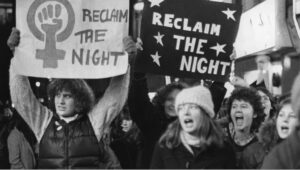Reclaiming the Night, a guest post by Ajay Close
Posted on November 22, 2023
The first lesson I learned as a teenage girl was that if you were out alone you were fair game. Building site whistles, catcalls from passing cars, obscene requests from gangs of cackling lads. Strangers falling into step, ‘Where you going, love?’ This could happen any time – I was once asked out by a milkman at 5am – but it felt more threatening at night.
It was the way things were. We put up with the hassle, thankful it wasn’t anything worse.

The UK’s first Reclaim the Night marchers were delegates at an Edinburgh conference on revolutionary feminism held in July 1977. Inspired by a march in Brussels the previous year, it was a spontaneous, small-scale affair. The marches held four months later in Bradford, Lancaster, Manchester, Newcastle, York and other cities across the UK were planned in advance. The impetus came from feminists in Leeds, where the man then only known as the Yorkshire Ripper had murdered four of his six female victims (the final tally was 13).
There were two themes: “fight rape” and “every woman has the right to walk alone at night without fear”. At midnight on November 12th over 100 women carrying flaming torches marched to Leeds city centre, where they danced and sang. It was at once a protest and a defiant celebration of female freedom, an exhilarating taste of the way things ought to be.
The organisers were a militant group of young women later to become famous (or notorious, depending on your politics) in the Women’s Liberation Movement. Known as Leeds Revolutionary Feminists, they staged many eye-catching protests against male violence and pornography during the late 70s and early 80s, smashing sexist department store windows, picketing sex shops, taking top-shelf magazines out of WH Smith and setting fire to them. This fearless, fascinating bunch inspired my seventh novel, What Doesn’t Kill Us, to be published by Saraband in February.
Reclaim the Night became a regular fixture in the feminist calendar, a coming together of women with a wide range of political affiliations, and none. Some brought their children along, but not their husbands or boyfriends. Men were the problem.
After years of crossing the road to avoid potential trouble, averting our eyes, doing our best not to be noticed, running wild was part of the protest. On Halloween 1978, marchers in Edinburgh dressed as witches and took over the Meadows, site of many a sexual assault. The same night, a march through Soho – then a centre of London’s sex trade – saw clashes with police and 16 arrests. Two thousand women turned up to march there the following January. Not everyone present endorsed the chants of “Death to Rapists” and “Castrate Men”.
After Peter Sutcliffe murdered Jacqueline Hill in November 1980, police advised women to stay at home after dark. Five nights later 500 women marched through Leeds, batting buses & cars, catcalling and groping men, paintbombing a cinema screening of Brian de Palma’s misogynist slasher movie Dressed to Kill.
The 90s was the heyday of the hard-drinking, promiscuous ladette. Many women saw reclaiming the night, and feminism in general, as an irrelevance. The marches petered out. When they were revived in the 2000s, initial attendance was poor. In London in 2004 only 30 women turned out, but the 2005 march drew 1,000. In 2006, over 200 marched in Ipswich, where five sex workers had been murdered.
Since then we’ve seen concern over falling conviction rates for rape, coupled with a heightened awareness of domestic violence and coercive control. The murder of Sarah Everard in 2021 was a shocking reminder that the streets are still not safe for young women. But feminism has evolved. In 2017 #MeToo provided a huge boost to the feminist movement , but gay men had their own complaints about abuse of power in the workplace. The seventies slogan men are the enemy has given way to a recognition that women aren’t the only vulnerable demographic. On Wednesday, Manchester University students will march to protect “women and marginalised genders”. Mixed marches are increasingly common, and even those that remain women-only tend to run a linked event welcoming men.
November 25th is the UN Day to end violence against women and girls. Reclaim the Night, also known as Take Back the Night, is now a global phenomenon, marked in over 30 countries. Marches will be held in towns and cities across the UK, including Manchester, Kirkcaldy, Cornwall and Exeter, over the coming week.
Ajay Close is the author of What Doesn’t Kill Us, published by Saraband in February 2024. Her first novel, Official and Doubtful, was longlisted for the Orange Prize (now Women’s Prize for Fiction).

